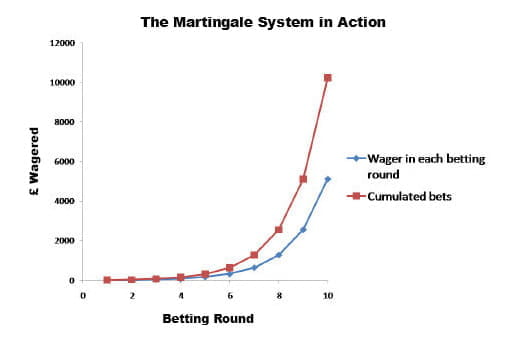Paul Pierre Levy, a French mathematician, introduced the Martingale Strategy as a method of betting or investing. It is considered a risky investment. This strategy is based on increasing the number of investments even if declining, with the expectation of future increases. The Martingale Strategy in betting requires that the gambler double his bet if they lose.
What is the Martingale Strategy?
Martingale is an investment strategy that seeks to minimize risk. This shows that one will not lose all the time statistically. Therefore, increasing your investments for every trade, even if they are declining, is essential in anticipation of a future price rise.
This strategy can be compared to gambling in a casino, where gamblers always aim to make a profit. This strategy allows gamblers to double their bets if they lose. The gambler can theoretically win by increasing the size of their bets each time they lose.
Martingale Trading Strategy for Crypto
Cryptos such as wise KuCoin has another advantage, making it more appealing for traders with the capital to follow martingale coinbot. Traders’ ability to earn interest means they can offset some of their losses by earning interest income. An experienced martingale trader might use currency pairs to achieve positive carry. They would then borrow money with low-interest rates and buy currency with higher interest rates.
Martingale allows you to reduce your take-profit each time a new order is placed. You can do this by doubling down your bet. This allows you to make a profit at a lower price. This strategy is very effective in a cryptocurrency market that is growing. Trading pairs such as BTC/USDT will pull back from the primary trend and then return.
It also works in a choppy market. This strategy may also be used in specific bearish markets. For example, it can quickly pull you out of losses with minor price rollbacks. However, if you fall into a long-term profit-less trend, you will likely lose all of your money and experience huge losses.
Several Martingale strategies can address the main drawback of this strategy, which is that it leaves people with shallow pockets bankrupt. This is one of them. Although you won’t break even with this strategy, it will help you return to your original position. Then, you apply the same strategy to double your bets if the original one loses. It is more like a protection strategy that protects your capital and gives you a higher chance of making a profit.
A basic example of the Martingale System
Let’s take a look at an example to understand the basic strategy. Let’s say you have a coin. You can play a game of heads or tails with a $1 starting bet. Each flip is independent, and there is an equal chance that the coin will land on either heads or tails. (The outcome of the flip before it does not affect the outcome after it.
You can keep sticking with the same call of heads or tails as long as you don’t change your mind. If you have infinite money, you will eventually see the coin landing on heads (or tails), and you will recoup all your losses plus $1.
Conclusion
Martingale’s strategies require a sharp mind and extreme caution. This strategy has one problem: seemingly effortless trades can blow up your account before your profits or losses can be recouped. It would help if you considered whether you’re willing to risk all of your account equity for a single trade.
Many feel that Martingale’s strategy is riskier than it offers. The average profit from doubling mechanics is much lower. This strategy has a low risk-to-reward ratio. However, the strategy requires that funds be spent on every loss to achieve a win. The final profit is equal to the initial investment. This strategy does not account for transaction costs. Its profitability is therefore not as high as we believe. Finally, trade size limits are often enforced by exchanges so that traders don’t have infinite chances of doubling their investment or winning a bet.

